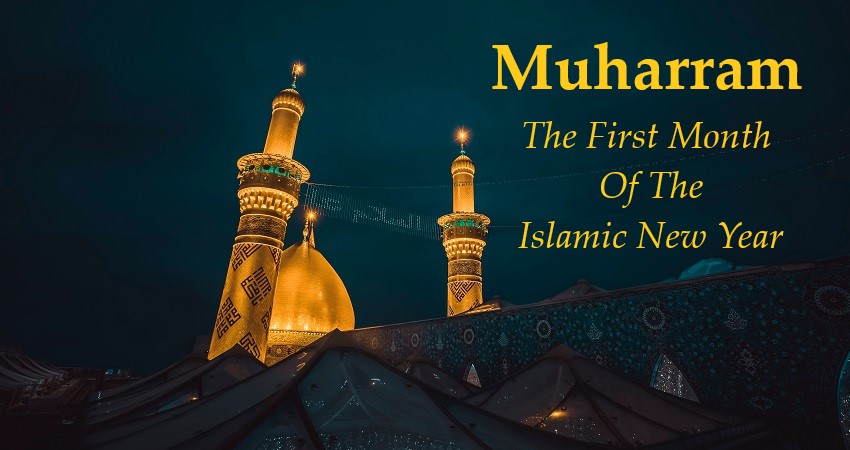The month of Muharram is a period of fasting, prayers, and refrain (from any joyous event). Muslims usually get together on this day to mourn the death of Imam Hussein, peace and blessings be upon him. To honour his martyrdom, they express sadness and grief in many ways.
They eat as little as possible; some Muslims don’t take anything until zawal (afternoon) as a part of mourning. Also, they read the ziyarat book, Ziyarat Ashura, which is a Salutatory Prayer to Husayn Ibn Ali and the saints of the Battle of Karbala, and contains salutations to the martyrs of Karbala.
What is Muharram?
Muharram-ul-Haram or the month of Muharram is the first month of the Islamic calendar. It is the start of the Islamic new year, and the tenth day of Muharram is known as the Day of Ashura. On this day, the Muslim honours the sacrifice of Imam Hussein, the grandson of Prophet Muhammad. It is the second holiest month in Islam, after Ramadan. As the name of the Prophet Muhammad is attached to it, it is also referred to as ‘the sacred month of Allah’.
Significance of Muharram
The mourning period begins on the 1st day of Muharram till the next 10 days until the death anniversary of Imam Hussein. Muslims wear black clothes, keep away from joyous events and practice fasting. Some Muslims even cut themselves with knives and sharp objects, beat themselves with chains and hold a mournful public procession. This painful practice is an expression of their grief and reiterates the significance of Muharram. Also, most people perform non-violent practices to mourning by holding sad processions and chanting “Ya Hussain” and wailing loudly.
The Day of Ashura is one of the most blessed and historically significant days of the year. Allah says in the Quran:
‘And We certainly sent Musa with Our signs, (saying), “Bring out your people from layers of darkness into the light and remind them of the days of Allah”. Indeed in that are surely signs for everyone who is patient and grateful’.
(Quran, 14:5)
The significance of Muharram month is rooted in the fact that Allah chose it to be and He commands His followers to not wrong themselves during the month. He encourages them to have pure intentions and righteous behaviour.
The History of Muharram
The history of Muharram is a story of tragedy and huge loss in Islam. About fourteen centuries ago, Imam Hussain, the grandson of Prophet Muhammad, was killed in the Battle of Karbala. It is said that in 680 AD, Hussain protested against the Caliph Yazid and led a revolution against him. This led to the Battle of Karbala where he was beheaded and his family imprisoned. Therefore, Muslims celebrate this day as the day that Husayn Ibn Ali was martyred. Even though he was slain in the battle, his victory and message of justice, kindness and equality still live among his followers.
Also, it is an auspicious day because Muslims believe that on the 10th day of Muharram, Moses (an important prophet in Islam) led the people of Israel through the Red Sea and gained victory over the Egyptian Pharaoh. This version of the history of Muharram month is observed without any sadness and grief.
Though Muharram is celebrated differently by various sects, it holds great importance among Muslims.
Prohibitions during Muharram
As Muharram is amongst the most sacred months mentioned in the Quran, acts like warfare are forbidden. The word ‘Muharram’ precisely means ‘forbidden’, making it so sacred that certain actions are considered to be forbidden during it as they would violate this festival’s holiness.
It is believed that both the Muharram and Al-Masjid Al-Haram obtained their names from the same root word, and both are sacred spaces where every action, good or bad, holds a lot of weight. Meaning, one should be extra careful about how he/she acts in a relationship, at work, during worship and even in his/her health and time management.
A Muslim’s past deeds carry more weight during the month of Muharram, just like in the Kaaba and its surroundings. This not only gives him/her an opportunity to achieve more rewards each day but also brings with it the risk of gaining more sins.
Virtues of Fasting in Muharram
The benefits and blessings obtained from fasting during Ramadan are bountiful. The same can be said for Muharram fasting. Only second to Ramadan, fasting in Muharram offers an individual to wipe their slate clean of minor sins accumulated during the last year. The all-forgiving Allah pardons the person who truly repents and fasts on the day of Ashura. Additionally, by fasting in Muharram, Muslims honor Imam Hussain and his actions while standing against tyranny and solidifying faith in Islam.
Prophet Muhammad (PBUH) said, “By fasting on the day of Ashura, I hope that Allah will accept it as an expiation for (the sins committed in) the previous year.” He encourages people to fast on the 9th and 10th (or 10th and 11th) days of Muharram. Prophet Noah also fasted on the day of Ashura in order to thank Allah for his blessings and mercy.
5 Facts about the month of Muharram 2022
- It is believed that spending the Day of Ashura by fasting will kill a Muslim’s past sins. Due to which, many Muslims keep a fast on the ninth and tenth day of Muharram.
- Also, fasting during Muharram is the most important and rewarding, second only to fasting during Ramadan.
- It is in this month that the Grand Mosque was seized by insurgents led by Mohammed Abdullah al-Qahtani in 1400 AH (1979).
- Islamic scholar Zayn al-Abidin, who was also the fourth Shia Imam, was martyred by Marvanian in the month of Muharram in 95 AH or 714 AD.
- The Muharram process is also called as Youm-e-Ashura.
Is it allowed to perform Umrah in Muharram?
There are no particular dates for performing Umrah. Muslims can go on the journey at any time of the year except for at the time of Hajj. Authorities in Saudi Arabia do not issue visas to foreign travellers three months before Hajj in order to make necessary arrangements for the upcoming pilgrimage. However, Umrah seekers can most definitely perform the sacred sites of Umrah in the month of Muharram.
During Muharram, Muslims pray to Allah for blessings and visit the mosque. They spend time with their families and cook something sweet to share with family and friends after breaking the fast. It is the month of the forbidden and holds immense importance in the Islamic faith.
Suggested read: Ramadan 2021: Dates, Traditions, Significance And Guidelines
Month Of Muharram 2022 FAQs
What is Muharram?
Muharram-ul-Haram or the month of Muharram is the first month of the Islamic calendar. It is the start of the Islamic new year, and the tenth day of Muharram is known as the Day of Ashura.
How do Muslims celebrate Muharram?
The Muslim community spends this period in mourning and honouring the death of Imam Hussein, the grandson of Prophet Muhammad. It is the second holiest month in Islam, after Ramadan. As the name of the Prophet Muhammad is attached to it, it is also referred to as the sacred month of Allah.
What is the significance of Muharram?
The mourning period begins on the 1st day of Muharram till the next 10 days until the death anniversary of Imam Hussein. Muslims wear black clothes, keep away from joyous events and practice fasting.
What is the history of Muharram?
About fourteen centuries ago, Imam Hussain, the grandson of Prophet Muhammad, was killed in the Battle of Karbala. It is said that in 680 AD, Hussain protested against the Caliph Yazid and led a revolution against him. This led to the Battle of Karbala where he was beheaded and his family imprisoned.
What do people do on Muharram?
During Muharram, Muslims pray to Allah for blessings and visit the mosque. They spend time with their families and cook something sweet to share with family and friends after breaking the fast. It is the month of the forbidden and holds immense importance in the Islamic faith.








